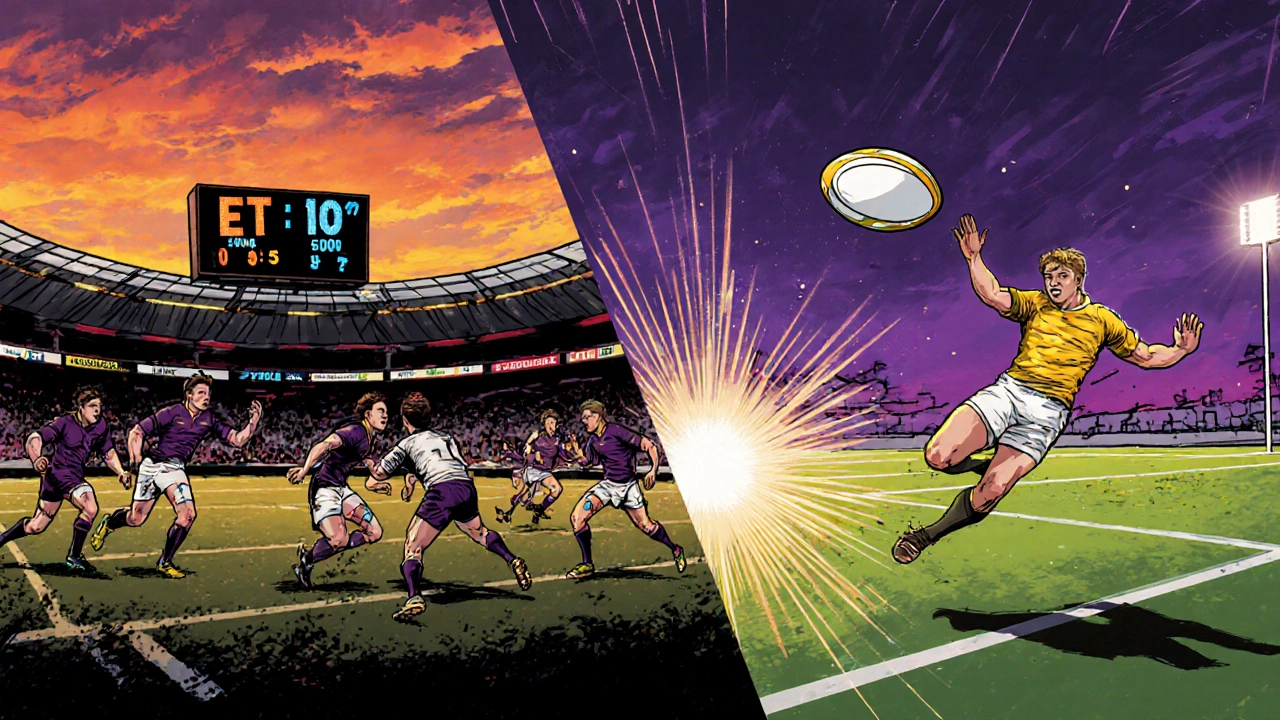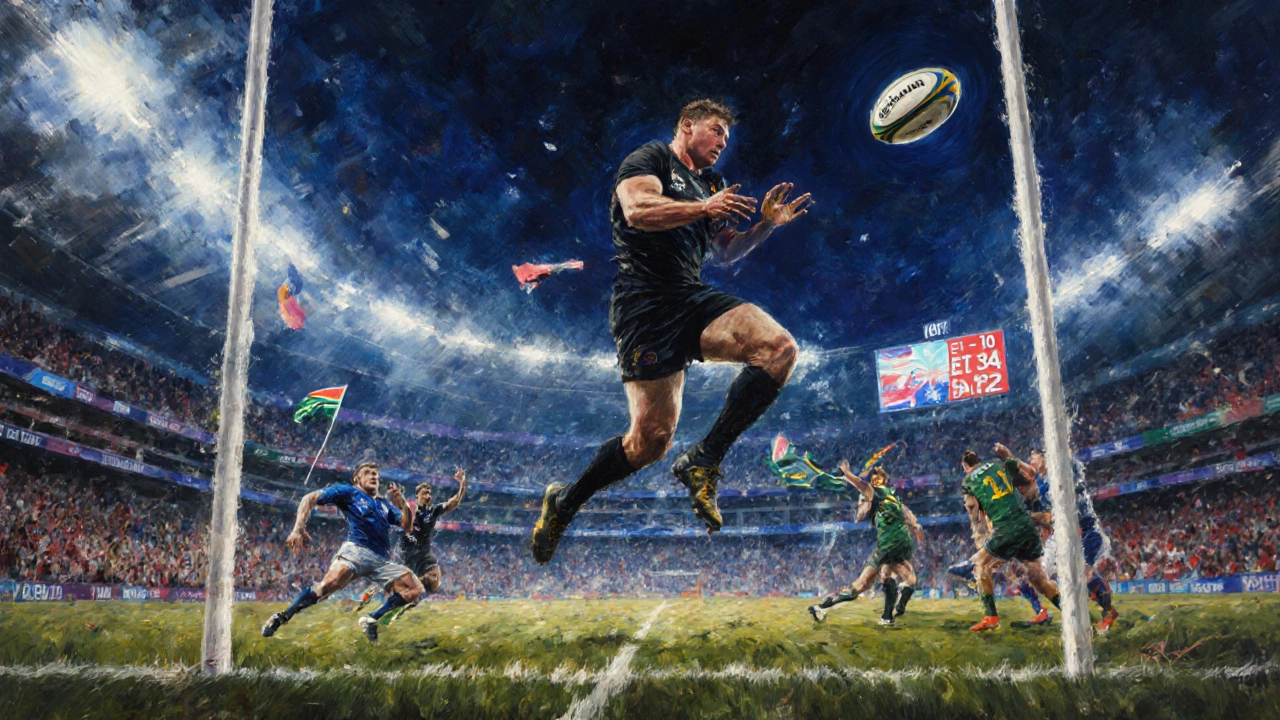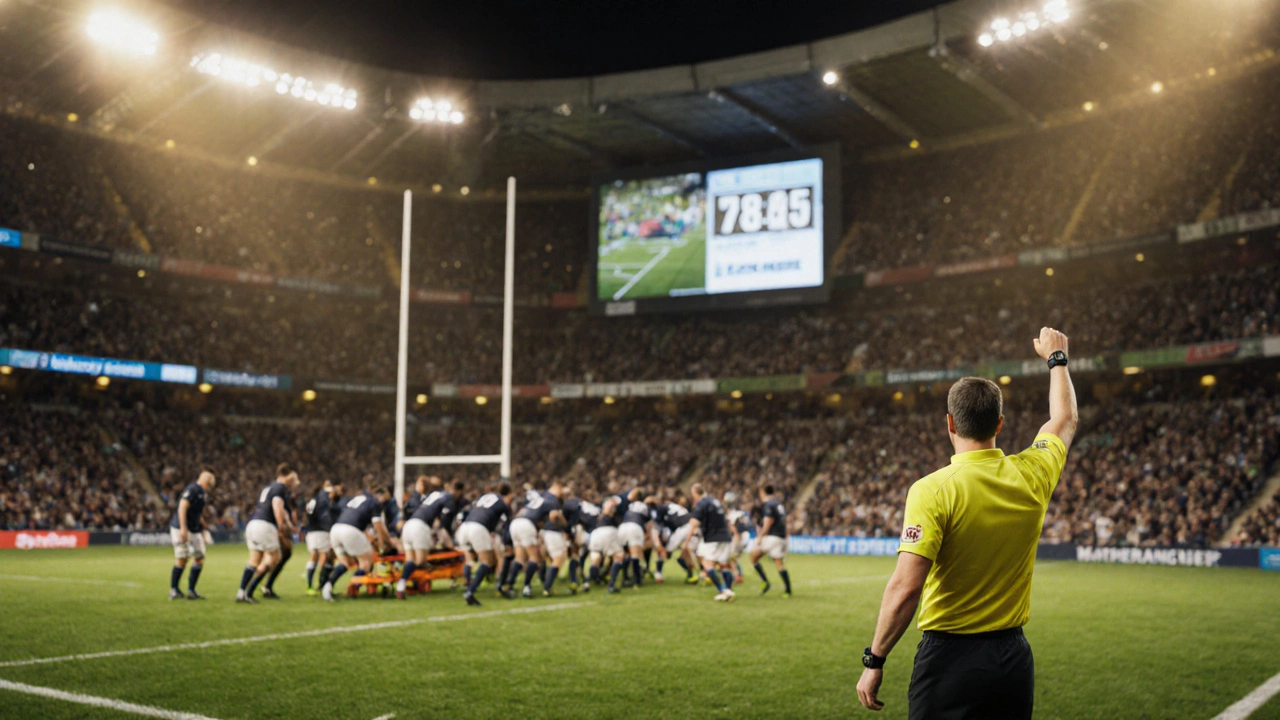Rugby Extra Time Scenario Calculator
Scenario Analysis
Quick Takeaways
- Standard rugby union matches run 80 minutes (two 40‑minute halves).
- Extra time is only used in knockout‑stage games that must produce a winner.
- World Rugby defines two main formats: a fixed 10‑minute period each way, or a sudden‑death "golden point".
- Stoppage time is added to each half for injuries, video‑referee reviews, and other delays, but it does not push the total past 80 minutes.
- Coaches plan for extra time by managing player fatigue, substitutions, and tactical kicks.
Understanding the Standard 80‑Minute Framework
When you hear the phrase "a rugby match lasts 80 minutes," the reference is to the regulated playing time for Rugby Union is the 15‑player code governed internationally by World Rugby. The clock starts at the kickoff of the first half and stops at the final whistle of the second half. Each half consists of 40 minutes of continuous time, but the referee can pause the clock for serious injuries, disciplinary actions, or to consult the Television Match Official (TMO). Those pauses are recorded as "stoppage time" and are added to the end of each half, ensuring the game still features a full 40 minutes of active play.
Because the clock is stopped for these interruptions, the total wall‑clock duration of a match can stretch to 100 minutes or more, especially in high‑intensity tournaments where injuries and video reviews are frequent. However, the official match length remains 80 minutes of playing time.
When and Why Extra Time Comes Into Play
Extra time, often called "overtime," only appears when a competition rule demands an outright winner and the scores are tied after the 80 minutes of regular play. This situation most commonly occurs in knockout‑stage fixtures-quarter‑finals, semi‑finals, and finals-where a draw would leave the tournament without a clear path forward.
World Rugby’s law book (Law 9) spells out the conditions for extra time. If a match is part of a tournament that specifies a winner must be decided, the referee will signal the start of extra time after the normal halftime interval. The decision to use extra time is never made in league play that allows draws; it is strictly a competition‑driven requirement.
Types of Extra Time Used in Rugby Union
There are two primary formats for extra time, both sanctioned by World Rugby is the global governing body that sets the laws and competition guidelines for rugby union:
- Fixed‑duration extra time: Two halves of 10 minutes each, with a short interval (usually 2‑3 minutes) in between. The teams switch ends after the first 10‑minute period.
- Golden point (sudden death): After a brief 5‑minute “pause,” the game continues for a maximum of 10 minutes. The first team to score any points-whether a try, penalty, or drop goal-wins immediately. If neither side scores, the match may proceed to a kicking competition.
Most recent World Cup knockout games have used the fixed‑duration format, reserving golden‑point only for specific regional tournaments or lower‑tier competitions.

Rules Governing Extra Time
The core law governing extra time is Law 9.12, which states that "the referee shall allow the game to continue for the prescribed period of extra time, unless the match is terminated earlier by a player being sent off for a serious offence, or by mutual agreement of the captains and the referee."
Key points that teams must follow during extra time:
- All substitutions made during the regular 80 minutes count toward the total allowed number (usually eight). No extra substitutions are granted.
- Durations of the halves (10 minutes each) are counted as playing time-clock stops for injuries and TMO reviews just as in regular time.
- If the competition specifies a golden‑point period, the clock stops only for serious stoppages; otherwise, the game ends the moment any points are scored.
- Rugby Law 8 (the tackle) and Law 9 (the scrum) remain fully enforceable; there is no relaxation of safety standards.
These rules aim to keep extra time fair, safe, and consistent with the rest of the match.
Impact on Players, Strategy, and Conditioning
Coaches treat extra time as an extension of the game, not a separate entity. Here’s what they keep in mind:
- Fitness management: Players who have logged a high workload in the first 80 minutes may be substituted early to preserve fresh legs for the potential extra period.
- Tactical kicking: In a fixed‑duration scenario, teams often adopt a territorial approach, aiming to force the opposition into a defensive position and capitalize on penalties.
- Penalty goal vs. try: In golden‑point, a quick drop goal can end the match, so teams practice set‑piece plays that create space for a successful drop.
- Psychological edge: Players who stay composed under fatigue often outperform their opponents in decision‑making, leading to crucial errors for the opposition.
Data from the 2023 Rugby World Cup shows that teams scoring first in extra time win roughly 62 % of the time, underscoring the importance of early momentum.
Historical Examples of Extra Time Drama
Some of the most memorable moments in rugby history have come from matches that pushed beyond 80 minutes:
| Year | Teams | Scenario | Result |
|---|---|---|---|
| 2003 Rugby World Cup | England vs. France (semi‑final) | Fixed‑duration (2×10 min) | England 24‑19 |
| 2015 Rugby World Cup | New Zealand vs. South Africa (quarter‑final) | Golden point | New Zealand 34‑32 (drop goal) |
| 2022 Six Nations | France vs. Ireland (final round) | Fixed‑duration | France 27‑26 |
| 2024 Super Rugby Pacific | Crusaders vs. Highlanders (play‑off) | Golden point | Crusaders 21‑20 (penalty) |
These matches illustrate how a tie after 80 minutes can turn into a nail‑biting finish that defines careers.

Common Misconceptions About "Stoppage Time"
Many fans think that the referee simply adds minutes at the end of the match, like in soccer. In rugby, the term "stoppage time" refers to the additional seconds added to each half for minor delays, not a lump‑sum that pushes the total over the 80‑minute mark. The clock is stopped during serious incidents, and the referee uses a watch to keep track of how much playing time remains. This is why you might see a game finish at, say, 83:45 on the clock, but the official match length is still recorded as 80 minutes of effective play.
Practical Checklist for Fans Watching Extra‑Time Games
- Know the competition’s extra‑time format (fixed vs. golden point).
- Watch the referee’s signals: a quick whistle after the 80‑minute mark means extra time is about to start.
- Notice substitution patterns-coaches often bring on fresh backs for attacking play when a try is needed.
- Stay alert for drop‑goal attempts in golden‑point; they can end the match instantly.
- Remember that player fatigue can lead to more handling errors, so the game may become more open.
FAQs About Rugby Extra Time
Why does a rugby match sometimes last longer than 80 minutes?
When is extra time used?
Extra time is only employed in knockout‑stage fixtures where a winner must be determined. If the score is tied after the regular 80 minutes, the competition rules dictate a 20‑minute extra period (two 10‑minute halves) or a sudden‑death golden‑point phase.
What is the difference between stoppage time and extra time?
Stoppage time is added to each half to make up for interruptions like injuries or TMO reviews, but it does not increase the total playing time beyond 80 minutes. Extra time, on the other hand, is a separate, predefined period added after the full 80 minutes when a result is required.
Can teams use extra substitutions during extra time?
No. All substitutions taken during the regular 80 minutes count toward the total allowed number. No additional replacements are granted for the extra‑time period.
What happens if no team scores in golden‑point extra time?
If the golden‑point period ends scoreless, the match is usually decided by a place‑kicking competition, similar to a penalty shoot‑out in football.
Has any World Cup final ever gone to extra time?
Yes. The 1999 Rugby World Cup final between Australia and France went into extra time, with Australia clinching the title 35‑12 after the additional period.
So the next time you see a match clock ticking past the 80‑minute mark, you’ll know whether you’re witnessing a brief stoppage period or the drama of rugby extra time unfolding. Understanding the rules behind those extra minutes adds a new layer of excitement to every knockout‑stage showdown.
